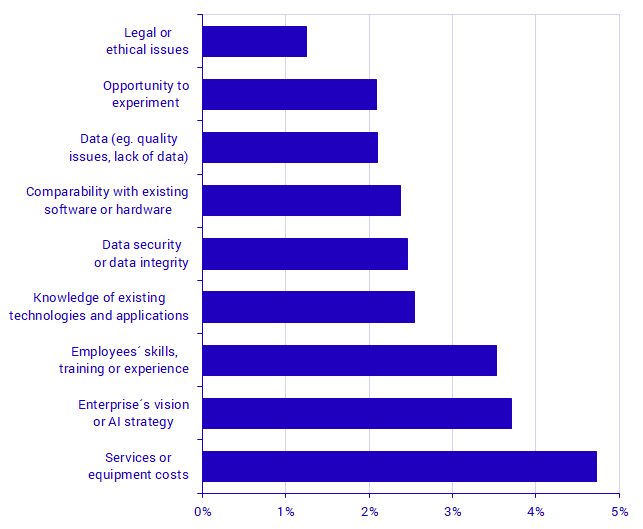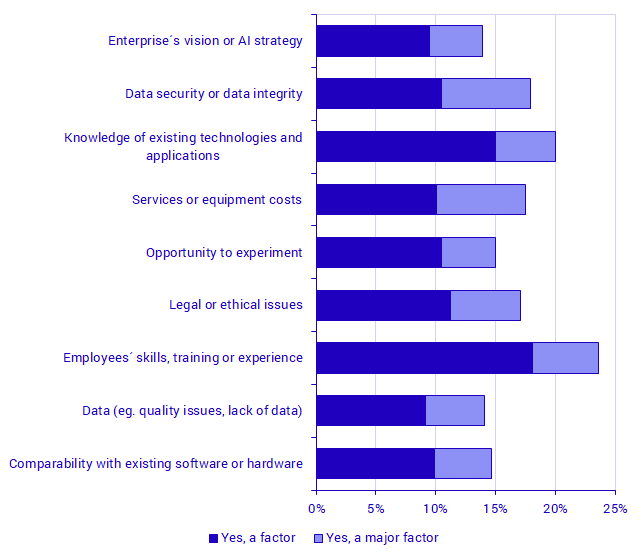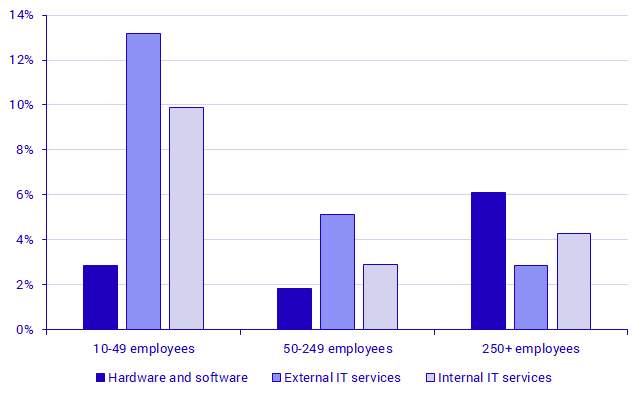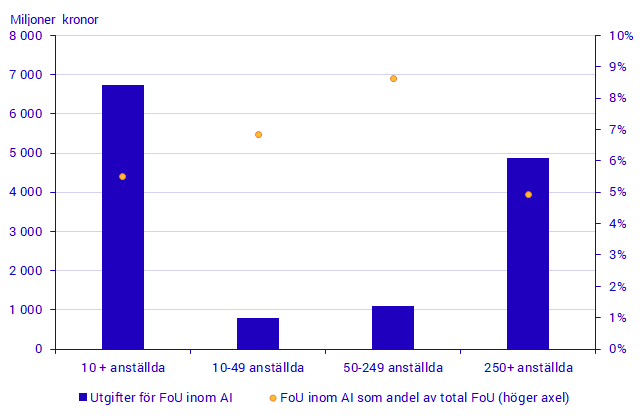Artificial intelligence (AI) in Sweden 2019
Artificial intelligence (AI) in Sweden 2019
Statistical news from Statistics Sweden 2020-11-25 9.30
During 2020, Statistics Sweden has examined the usage of, expenditure and research on artificial intelligence (AI) in Sweden. This survey involved mapping of AI in both the business enterprise sector and the government sector, based on an assignment from the Ministry of Infrastructure.
Using AI was more common in the government sector
Among the surveyed enterprises, 5.4 percent stated that they used some form of AI in their operations in 2019. The corresponding figure in the government sector was 10.2 percent, and 12.2 percent in the higher education sector.
| Percent | CI (±) | |
|---|---|---|
| Business enterprise sector | 5.4 | 0.8 |
| Government sector | 10.2 | ‑ |
| Higher education sector | 12.2 | 0.9 |
In the business enterprise sector, the most common reason for using AI was to improve an existing product or service; 3.2 percent listed this reason.
| Percent | CI (±) | |
|---|---|---|
| The enterprise used AI to develop or increase knowledge of costumers or users | 2.6 | 0.6 |
| The enterprise used AI to develop a new product or service | 2.5 | 0.5 |
| The enterprise used AI to improve an existing product or service | 3.2 | 0.6 |
| The enterprise used AI to improve internal processes | 2.1 | 0.5 |
| Other use of AI | 0.6 | 0.2 |
| Total | 5.4 | 0.8 |
In the government sector, the most common reason for using AI was to improve internal processes; 6.5 percent listed this reason.
| The organization used AI to | Percent |
|---|---|
| develop or increase knowledge of costumer or users | 5.1 |
| develop a new product or service | 5.5 |
| improve an existing product or service | 5.9 |
| improve internal processes | 6.5 |
| Other use of AI | 5.1 |
| Total | 10.2 |
In the business enterprise sector, service or equipment costs was the largest factor hampering use of AI; 4.7 percent of the enterprises stated that this was a major obstacle.
Percentage of enterprises that answered “Yes, a major factor”, by factor, business enterprise sector, percent, 2019

In the government sector, employees’ skills, training or experience constituted the main obstacle; 5.5 percent of the organisations found this to be a major obstacle. Other common obstacles also included a lacking vision or AI strategy in the enterprise or organisation, and a lack of knowledge of existing technology and applications.
Percentage of enterprises that answered “Yes, a major factor” and “Yes, a factor”, by factor, government sector, percent, 2019

There is also some uncertainty, both within the business enterprise sector and the government sector, on which factors constitute an obstacle for the use of AI. Around one in three enterprises answered that they "don’t know" when asked whether or not a factor constituted an obstacle for the use of AI. The corresponding proportion in the government sector was between 14 percent and 19 percent.
The business enterprise sector spent 5.6 SEK billion on AI in 2019
Total business enterprise sector expenditure on AI-based software or hardware was around SEK 5.6 billion in 2019. This includes costs and investments in AI-based software or hardware and purchases of these products through internal or external IT services.
| SEK millions | CI(±) | |
|---|---|---|
| Expenditures and investments in hardware and software | 2 407 | 391 |
| Expenditures for External it-services | 2 217 | 727 |
| Expenditures for Internal it-services | 1 000 | 221 |
| Total | 5 624 | 402 |
The corresponding sum in the government sector was SEK 149 million.
| SEK million | |
|---|---|
| Expenditures and investments in hardware and software | 78 |
| Expenditures for IT-services | 71 |
| Total | 149 |
Large enterprises (250 employees or more) had the largest expenditures on AI-based software and hardware, SEK 3.9 billion. However, as a percentage of total IT-related costs and investments, small enterprises (10-49 employees) expenditures on AI were larger, 10.6 percent.
AI-based expenditures and investments as a percentage of total IT-related expenditures and investments, by size class, business enterprise sector, percent, 2019

Research and development in AI is concentrated to a few limited performers
In 2019, around 700 enterprises carried out own research and development in AI. Total costs and investments amounted to SEK 6.7 billion. Research and development in AI accounted for 5.5 percent of total R&D-related costs.
Expenditures and investments for R&D in AI, by size class, business enterprise sector, SEK millions and as a percentage of total R&D expenses, 2019

Research and development in AI is concentrated to a few limited performers. Ten enterprises accounted for 65 percent and 20 enterprises accounted for 72 percent of total business enterprise sector costs of and investments in research and development in AI during 2019.
Definitions and explanations
All amounts are prsented in current proces
Artificial intelligence (AI) refers to systems that display intelligent behaviour by analysing their environment and taking actions, with some degree of autonomy, to achieve specific goals. AI-based systems can be purely software-based or can be embedded in hardware.
Applications for AI can include:
- Image and video analysis for diagnostics or facial recognition systems based on computer vision or voice recognition systems;
- Machine translation, speech to text programs, text analytics or chat robots based on natural language processing;
- Decision support, security systems, traffic analysis, fraud detection, recommendation systems, process optimisation or recruitment software based on machine learning;
- Autonomous drones, self-improving robots for production or warehouse tasks or self-driving vehicles.
Publication
Statistical Database
More information is available in the Statistical Database
Feel free to use the facts from this statistical news but remember to state Source: Statistics Sweden.
